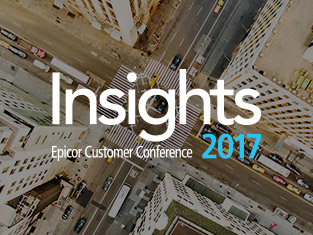P21WWUG CONNECT – BOOTH 25
The 2021 Prophet 21 user conference (P21WWUG CONNECT) is less than a week away. For those of us in attendance, it is an exciting time for collaboration and discovery. User conferences are a great opportunity to trade ideas with other users and get a sense of the shared and unique challenges faced by different companies, in different industries.
Having manned a few booths over the years, I’ve been lucky enough to hear many ERP stories and more than a few customer ERP quandaries. One such quandary that cyclically arises has to do with the question of application deployment. As hardware ages and operating systems expire, customers often find themselves scrambling to determine whether to replicate past deployment models or explore new options.

Software-as-a-service, public cloud, private cloud, managed hosting, infrastructure-as-a-service—the options abound and overlap, and it’s easy for options to slip though the cracks. As such, customers sometimes approach our booth simply looking to understand what options are available, relative to their current situation. In our conversations with such customers, we normally run though a set of questions to better understand our customer’s current state, the issues they face, and the opportunities available to them.
With that in mind, and with the P21WWUG CONNECT 2021 event on the horizon, it might be beneficial to understand some of the early considerations to make, as you approach the question of application deployment. Answers to these questions can set you on a path to understanding how you might want to deploy the next generation of your P21 application.
Do you have outdated hardware? How old are your servers?
As your hardware ages, it becomes an increasing risk to your organization, and many companies are accustomed to the 5-year cycle of hardware replacement. But the technical footprint of our current world differs considerably from five years ago, and this provides new options in 2021 that would not have been viable in 2016. Server deployments do not mandate an on-premise data center. Review the options for private cloud server deployments before signing the check for a new server stack.
Does the customer have outdated operating system of RDBMS versions causing downtime, security risks, lack of backups, compliance or cost?
Like hardware, an operating system can exceed its use-by date, creating several potential issues. This overlaps with version upgrades of your P21 ERP, as ERP versions are restricted to specific operating system and database versions. As such, ERP upgrades are often partnered with upgrades to a customer’s database and operating system.
Like hardware, an operating system can exceed its “use by” date, creating several potential issues. This overlaps with version upgrades of your P21 ERP, as ERP versions are restricted to specific operating system and database versions. As such, ERP upgrades are often partnered with upgrades to a customer’s database and operating system.
Are you struggling to find the right IT support for your hardware, your server, or your application?
Whether IT support is internally supplied, or outsourced from a managed service provider, companies frequently encounter support challenges, whether it is with capacity, capability, or delivery. Most often, as your business grows, your IT capacity might be stretched beyond its original capacity. Such is an opportunity to evaluate a cloud deployment, to apportion the management of the application to a partner, allowing you to focus on mission-critical IT projects and initiatives.
Is your P21 application currently hosted by another provider and are you looking for different options? Are you unhappy with your current situation due to downtime, latency, security, compliance or cost?
Even within a private cloud hosting environment, different options are available, in which certain resources are dedicated, while others are shared. These differences can impact price, performance, and service levels, and its important to understand whether the cloud configuration you’ve been provided is meeting your needs, or whether a different configuration, perhaps though a different provider, would be preferable.
Are you thinking about moving your Prophet 21 install “to the cloud” and looking to know more about what that might mean?
A cloud deployment of your P21 ERP application could mean different things. On one end of the spectrum, you have software as a service (SaaS). In SaaS, the application is deployed to a public cloud.
Is the customer on P21 SaaS and considering moving back to an on-premise / hosted /perpetual license version?
A software-as-a-service (SaaS) deployment of any ERP application can bring many benefits to an organization. But a SaaS deployment does not work for all customers, and it is not uncommon for customers to purchase a SaaS version of an ERP and decide to shift to its more robust and fully-functional perpetual-license counterpart. But moving back to a perpetual license does not mandate a move to an on-premise deployment. Cloud options are still available.
Are you planning for a P21 upgrade and looking for options?
An upgrade, especially a major release, can be an opportunity to consider your deployment options. What is the best way to deploy the new version? Does the new version change the server configuration in any way? Prophet 21’s deployment evolved across versions, as Epicor deployed a middleware application server layer as part of the new architecture. The change required a new server stack. Understand how big a jump you have in front of you by developing a P21 upgrade roadmap that includes a deployment that matches your business needs.
Are you concerned about Epicor dropping their support for the Legacy client and looking for options?
The rush to Epicor’s middleware server is too hasty for many in the user community, and customers are still trying to make sense of P21’s web client and hybrid client deployments. With this change comes opportunities to deploy hybrid client models, to allow certain users to continue to leverage the legacy client.
Is the customer looking to update overall technology stack as part of the implementation of an integrated system (E-commerce, SRM, CRM)?
Sometimes, the integration of a third-party platform requires an upgrade to the overall ecosystem. Such is an opportunity to review your server installation and consider your options.

